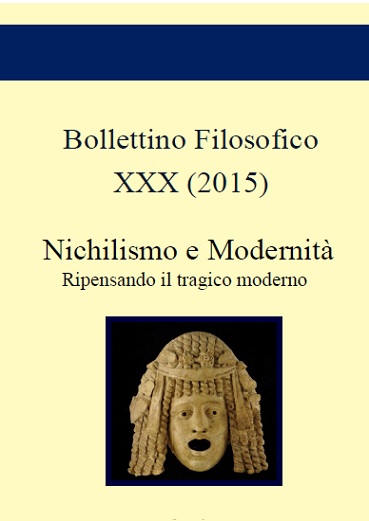Tragic thought and Hermeneutics
DOI:
https://doi.org/10.6093/1593-7178/3689Keywords:
Nihilism, Pascal, Tragic, Hermeneutics, ParadoxAbstract
Many philosophies take their origin from the state of uncertainty, contradiction, anguish of human condition. However in modern thought, apart from few cases (such as in Pascal), philosophies have been a strategy to avoid facing the tragic. In the nineteenth century and in the twentieth century there has been a revival of tragic thought. The present paper, however, focuses on an indirect dimension of the tragic, investing the condition of philosophical thought, namely the tension between objectifying thought and speculative thought, which today appears as the conflict between analytical and hermeneutical thinking, and is reflected within the hermeneutic thought. The full awareness of this contrast leads the speculative thought to take the form of paradox.Downloads
Downloads
Published
How to Cite
Issue
Section
License
The author retains the copyright of his work whilst granting anyone the possibility “to reproduce, distribute, publicly communicate, publicly exhibit, display, perform and recite the work”, provided that the author and the title of the journal are cited correctly. When submitting the text for publication the author is furthermore required to declare that the contents and the structure of the work are original and that it does not by any means compromise the rights of third parties nor the obligations connected to the safeguard of the moral and economic rights of other authors or other right holders, both for texts, images, photographs, tables, as well as for other parts which compose the contribution. The author furthermore declares that he/she is conscious of the sanctions prescribed by the penal code and by the Italian Criminal and Special Laws for false documents and the use false documents, and that therefore Bollettino Filosofico is not liable to responsibilities of any nature, civil, administrative or penal, and that the author agrees to indemnify and hold Bollettino Filosofico harmless from all requests and claims by third parties.

